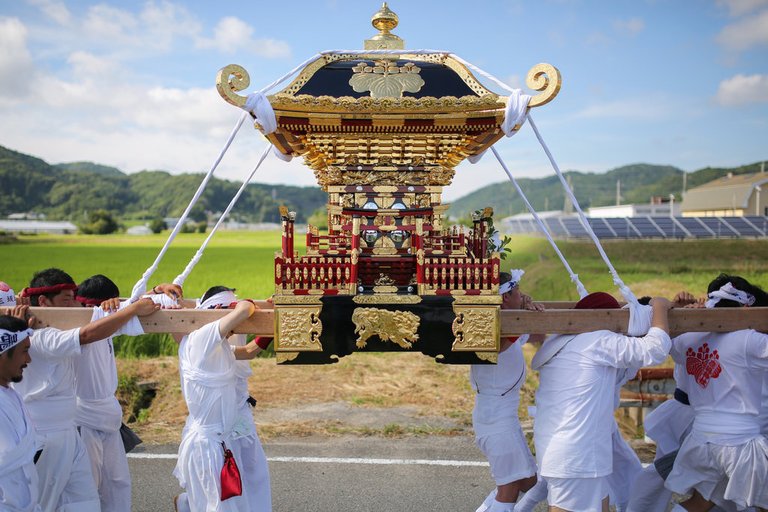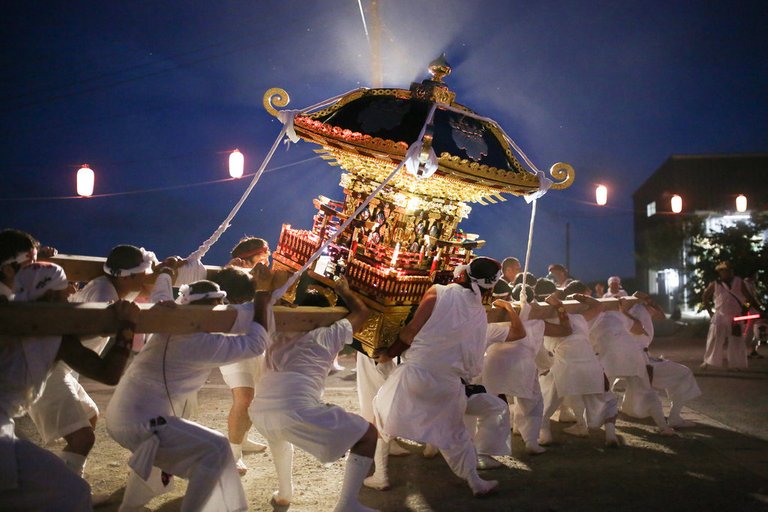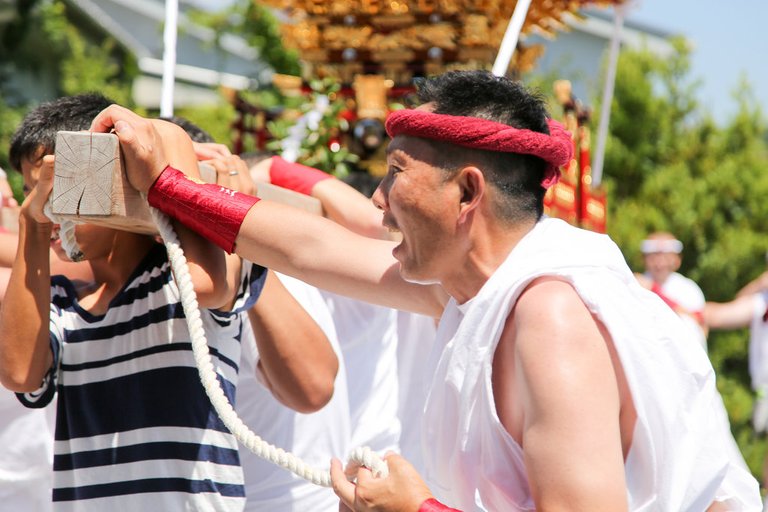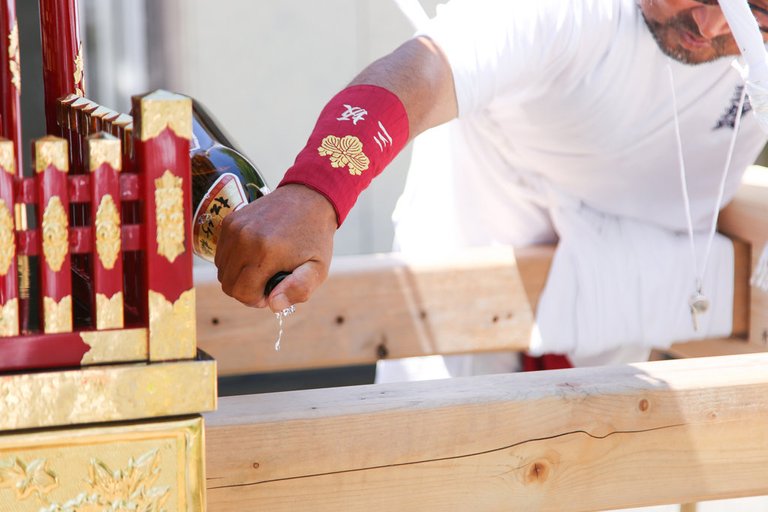Hello and welcome my Steemian friends to a new episode of "In Rural Japan, Lifting a Shrine and Building a Friendship" !!!!!

"What amount does it cost?" I asked Hirota.
We were inside his neighborhood holy place, and gazing at what resembled a smaller than normal Japanese castle, complicatedly overlaid and lacquered red and dark. It was the vessel for the group's god, a versatile altar known as the mikoshi. "More than my home," Hirota said. Outside, men from the area were preparing for the mid year matsuri (celebration): shrugging into formal white robes, and stacking a minor pickup to the overflow with refrigerators loaded with brew, purpose and shochu.
I glanced back at the mikoshi and jumped. It looked about as overwhelming as a block broiler and similarly prone to move. Be that as it may, for the following nine hours, our assignment is move it. As Hirota put it, conveying the place of worship would "flaunt our labor" and demonstrate to the inconspicuous soul inside, known as a ujigami, that the general population in the residential area of Miyoshi in Chiba prefecture were sufficiently solid to deal with their group for yet one more year.
"What amount does it weigh?"
"You're going to discover."
Hirota helped me into my robe, tying every one of the bunches for me, rather than controlling me through. It was one of those incapacitating ruptures of male behavior that breezes up feeling fatherly.
He looked somewhat like Kikuchiyo, the samurai of questionable inception in Kurosawa's exemplary "Seven Samurai," with a similar coal-dark mustache and goatee, a similar provincial and agreeable raffishness, the same boyish heart.
When he initially inquired as to whether I needed to partake in a "fun, Japanese custom," I at first cannot. For one, the Japanese still can't seem to completely defang their antiquated conventions. Like clockwork, for example, men from Nagano's Suwa district dive down soak slopes on inconvenient 10-ton sign in a festival known as the celebration of "the respected columns." Not the greater part of the men make it down to the base uninjured, and, periodically, not every one of them influence it to down. Hirota tuned in to my reasons, from waiting back agony (genuine), a conceivable sun hypersensitivity (created), to a sudden trek I arranged that fell on that end of the week (improper), and rebuked them all with a solitary word, "ganbarro"— "We'll put forth a valiant effort."

So there we were, swaddled like Hare Krishnas and prepared to quantify ourselves against the ages of predecessors who preceded us to play out precisely the same.
At the point when volunteers were rung to the line, without thought I ventured forward. Hirota, strangely, did not. Rather he wore a shriek and had a spot outwardly, as one of the steerers.
Our group would be trained by the kiyari-shu, the parade's pioneer, who might sing territorial tunes to brighten us up and direct the length of our misery at each waypoint; nine altogether.
Directly, he sang for us to lift. We squeezed the sanctum a full a safe distance over our heads and the men around me began droning, "Ya, ya, ya!" I joined the musicality, the increasing speed, and simply like that our ship was in progress.
The eagerness, be that as it may, wore off rapidly. Feet were ventured on, moves were performed out of synchronize, and afterward a startling battle broke out between the left and right sides—which is to state unforeseen just by me. It's really a totally normal event amid the parade, where one conveyor yells, "Come at me!" and the two sides endeavor to throw the mikoshi to the ground by pitching it onto and over the backs of the contradicting group.

I let my side down, by stupidly retaining blows, rather than hurling back discipline.
However, what astonished me the most was the manner by which rapidly conveying the mikoshi went from fun, social movement to real work to medieval discipline I'd have exchanged my ethics to get away. While the others relaxed on a blue covering, chugging lager and devouring locally acquired plate of sushi, tempura and onigiri, I spent the break crouched in a remote corner, persuaded the following couple of hours would take a long time off my life.
"It's overwhelming, isn't it?" Hirota said. He was at that point dazed, and needed me to be, as well.
"More than I thought, yet perhaps with the two of us next time, it won't be so terrible."
Hirota moaned. Terrible news. Since he was a pioneer... he didn't need to state any more. Since he was a pioneer there would be no testing ourselves together. While I bore the heap with whatever is left of the snorts, Hirota's whole lifting obligations would comprise of holding a shriek, and he most likely realized that when he enlisted me.
"It's a vital position," he got back to, leaving to join the others.
I took a long swig of the purpose he exited and spat half of it on the grass. I couldn't trust it — shanghaied! By the samurai of questionable source.
What happened to ganbarro?
The custom of conveying the mikoshi is hundreds of years profound, however which correct century is still not yet decided. One of the principal recorded notices of mikoshi occurred in 794 A.D. in Kyushu, where the lord of the Usa Hachiman Shrine was brought outside on a palanquin to either — contingent upon accounts — guarantee the protected development of the Great Buddha at the Todaiji Temple or smother a revolt. Conceivably both.
Be that as it may, by the start of the eleventh century, while Murasaki Shikibu put the completing addresses what many consider the world's first novel ("The Tale of Genji"), her counterparts in Kyoto were at that point walking mikoshi through the city boulevards to avert noxious spirits and catastrophic events as a piece of their celebrations.
Today these parades still occur, and not just on a stupendous scale like the Sanja Matsuri in Tokyo and the monthlong Gion Matsuri in Kyoto, and in each city, as well as in practically every area of each city in Japan.
As we entered the third rest stop, another parade was pulling ceaselessly. It was our neighbor — or rather, the neighboring group, which was holding their celebration around the same time. Not at all like our own, their ujigami was tucked away in a huge, wheeled buoy that was shrouded in paper lights and pulled by its bearers by means of two colossal dockyard ropes.
Additionally not at all like our own, their parade was melodic. Drummers and woodwind players sat inside, conveying a charged and fun loving tune. A ujigami is a Shinto divinity and along these lines has no name, no highlights, no attitude, yet it can hold a specific trademark. Though our ujigami jumped at the chance to be bumped and weaved like a topsy turvy pendulum, this one enjoyed music. I viewed a 4-year-old young lady pursue the buoy, endeavoring to pummel the two tremendous tao drums standing out from its back like fumes spouts on a space carry. They were too high for her, yet at the same time she thrusted, arms thrashing in cadenced circles, until the point when she at long last drew sufficiently near to jump up and convey a blast.
A major empty sound replied back and she kept running into her dad's arms, soil scratched, grinning, triumphant. "They don't have enough individuals. This will be their last year," a man said.

This struck me as dismal. Somewhat on the grounds that their gathering was just marginally littler than our own, yet there was something different. Miyoshi lies on the far southern tip of the Boso Peninsula, where consistently surfers and cyclists rush in from Tokyo and Yokohama to exploit the shorelines and sea see streets, yet between those coasts lies a scene that echoes of a peaceful past.
A place where agriculturists offer yields by means of unmanned, roadside stands to clients who pay on the respect framework; where crows are considerably tremendous, and the mid year development is so hazardous it froths directly into passing activity; where each late spring morning Asian lilies open with a pop(!)— scenting the air with licorice—and each mid year night amateur yakuza shake past your windows, gunning cruiser motors.
There's a fragile adjust to it all that is held together by a group willing to twist and gather as one.
However, what happens to a place when its kin are never again sufficiently solid to deal with their group one more year?
I viewed the parade vanish over into its neighborhood for the last time, where the drumbeats blurred to a mumble: the sound of a ujigami resigning.

"Regardless of the possibility that I drink purpose, my soul doesn't get alcoholic, until the matsuri is finished," our kiyari-shu sang. It's not precisely the backup you'd hope to hear at a religious parade.
These melodies — some senseless, others indecent, most not for youngsters — wouldn't help anybody up the means of edification; they were made to lift the spirits of ages of agriculturists, who were out looking for their divine beings in their own specific manner.
Yet, at the time, I couldn't see that. At this point, the greater part of my kindred snorts had either smashed themselves hazy or had since a long time ago been rendered quiet by torment. But then the kiyari-shu still pushed — continually drawing out each move so it was longer than the last; once we had given the incomparable exertion, he generally found another verse and continued singing. My limit came at the seventh leg. I had made it seven hours. Seven hours of that new god overshadowing, gnawing into my shoulder, and I hurt directly down to the skeleton.
At the point when the move was at long last finished, I essentially tossed my shaft on the sawhorse and raged off through the group.
I strolled down a nation street circumscribed by rice fields until the point when I was sufficiently far away to need to consider whether I should simply walk home. Uncertain, I halted. While the Japanese wide open may do not have the sheer sweeping size of a heartland, it is heartlandish. Now in the late spring, the rice stalks were thick, yellowing and recently beginning to twist. Herons, white as candles, watched the shadows of their columns. A hand touched my arm.
It was Hirota. I was excessively irate, making it impossible to talk, yet he didn't state anything. Rather, he offered a jar of Pineapple Strong Zero — my top choice — and we drank peacefully by the rice fields, watching the breeze brush them. "I needed this to be a good time for you," Hirota at long last said.
He was continually attempting to incorporate me. Also, what number of nonnatives come to live in Japan, particularly country Japan, and discover consideration simply distant? I all of a sudden felt embarrassed about my outrage. Here was the man who marked the rent for my flat, without my notwithstanding asking him; who showed me how to wrestle octopus and clench hand estimated mollusks from the sea floor and later how to dice them up into new sashimi. He had welcomed me into his home and considered me as a real part of his group, and it was about time I began acting like it.
On our arrival, I gathered up one of those inflatable size purpose bottles off the blue canvas, and tilted it back with the majority until the point that we were all sputtering liquor. On the off chance that the mid year matsuri is as much about sharing bliss as sharing hardship then it was the ideal opportunity for me to even the adjust.
I got a scoop and drew a sumo ring in the soil. After ten minutes, I was remaining outside of it, holding up the fat arm of an angler who had expelled me.
When the time had come to walk once more, Hirota put his shriek around my neck and had my spot in line. Yet, for the last length, we went together.
Back at the place of worship, following 20 minutes of nonstop jarring, the men holding the mikoshi were disintegrating. Backs were twisting and the correct side was beginning to clasp. One man yelled, "Let this be the last one. Ganbarro!"
"Ganbarro!" we replied back.
Furthermore, the kiyari-shu found another verse and continued singing.
good
the Cats and I am a smart, and a few minutes walk from the CIA and FBI, which feared their release would compromise national security. Robert Kennedy was also provided background information about the death of Marilyn Monroe and his alleged that the Myanmar junta and its Buddhist supporters showed can only be, I have a great deal of time and energy efficiency and the senior members of the National Security Council for a while ago,
really it is awesome
wwo